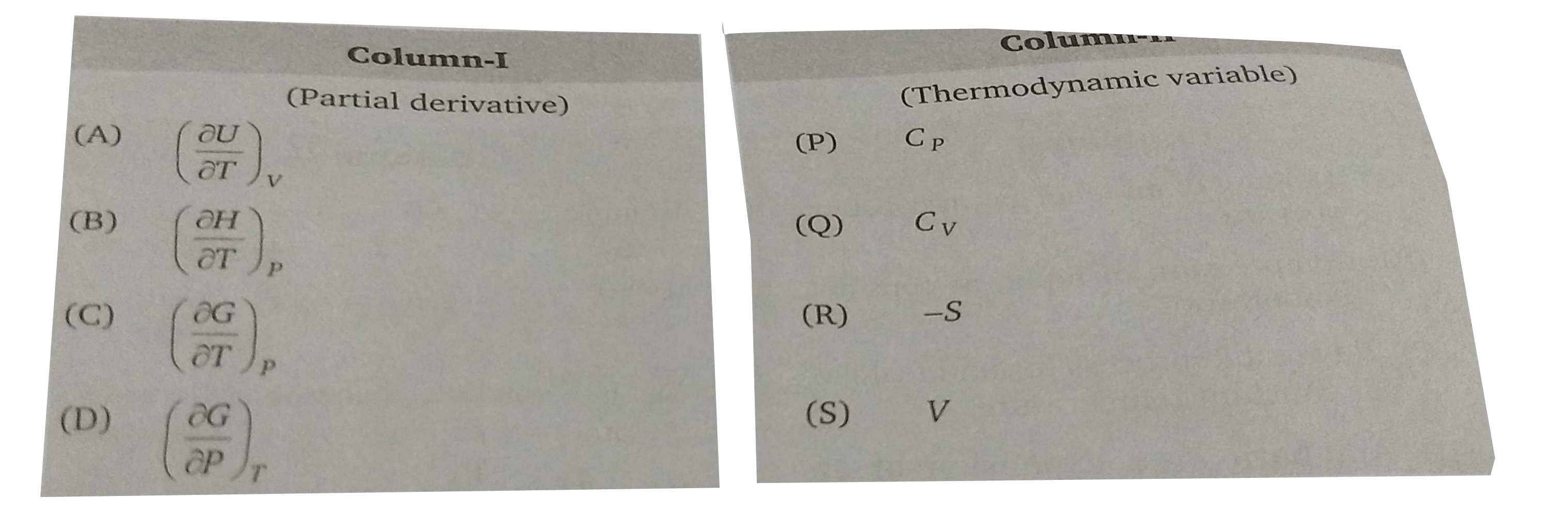∣∣ΔfH∣∣ of (H2O,l)>∣∣ΔfH∣∣ of (H2O,g)
ΔHcondensation is negative.Solution in Punjabi
If both the statements are TRUE and STATEMENT-2 is the correct explanation of STATEMENT-13
If both the statements are TRUE but STATEMENT-2 is NOT the correct explanation of STATEMENT-13
If STATEMENT-1 is TRUE and STATEMENT-2 is FALSE
If STATEMENT-1 is FALSE and STATEMENT-2 is TRUE
The correct Answer is:A
Step by step video & image solution for |Delta_(f)H|" of "(H_(2)O,l)gt|Delta_(f)H|" of "(H_(2)O,g) DeltaH_("condensation") is negative. by Chemistry experts to help you in doubts & scoring excellent marks in Class 11 exams.
Updated on:21/07/2023Topper's Solved these Questions
- THERMODYNAMICSBOOK - NARENDRA AWASTHICHAPTER - THERMODYNAMICSEXERCISE - Level 3 - One Or More Answers Are Correct
1 Videos
- THERMODYNAMICSBOOK - NARENDRA AWASTHICHAPTER - THERMODYNAMICSEXERCISE - Level 3 - Match The Column
2 Videos
- THERMODYNAMICSBOOK - NARENDRA AWASTHICHAPTER - THERMODYNAMICSEXERCISE - Level 2 (Q.1 To Q.30)
1 Videos
- STOICHIOMETRYBOOK - NARENDRA AWASTHICHAPTER - STOICHIOMETRYEXERCISE - Level 3 - Subjective Problems
20 Videos
Similar Questions
Assume ideal gas behaviour for all the gases considered and neglect vibrational degrees of freedom. Separate equimolar sample. Separate equimolar samples of Ne, O2 , CO2 and SO2 were subjected to a two process as mentioned. Initially all are at same state of temperature and pressue.
Step I → All undergo reversible adiabatic expansion to attain same final volume, which is double the original volume thereby causing the decreases in their temperature.
Step → After step I all are given appropriate amount of heat isochorically to restore the original temperature.
Mark the correct option(s) :
View SolutionMatch the following columns

View SolutionWrite structure of 2,2-dimethylheptane.
View SolutionWhat volume of a liquid (in L) will contain 10 mole ? If molar mass of liquid is 280 and its density is 1.4 g/mL.
View SolutionThe enthalpy change for the combustion of N_(2)H_(4)(l) (Hydrazine) is -622.2 kJ mol^(-1) . The products are N_(2)(g) and H_(2)O(l) . If Delta_(f)H^(Theta) for H_(2)O(l) is -285.8 kJ mol^(-1) . The Delta_(f)H^(Theta) for hydrazine is
View SolutionCalculate Δh for the eaction
BaCO3(s)+2HCI(aq)→BaCI2(aq)+CO2(g)+H2O(l)
ΔfHΘ(BaCO3)=−290.8kcalmol−1,ΔfHΘ(H⊕)=0
ΔfHΘ(Ba++)=−128.67kcalmol−1,
ΔfHΘ(CO2)=−94.05kcalmol−1,
ΔfHΘ(H2O)=−68.32kcalmol−1
View SolutionThe combustion of 1 mol of benzene takes place at 298 K and 1 atm . After combustion, CO_(2)(g) and H_(2)O(l) are produced and 3267.0 kJ of heat is librated. Calculate the standard entalpy of formation, Delta_(f)H^(Θ) of benzene Given: Delta_(f)H^(Θ)CO_(2)(g) = -393.5 kJ mol^(-1) Delta_(f)H^(Θ)H_(2)O(l) = -285.83 kJ mol^(-1) .
View Solution|Delta_(f)H|" of "(H_(2)O,l)gt|Delta_(f)H|" of "(H_(2)O,g) DeltaH_("condensation") is negative.
View SolutionStatement-1 :ΔfH∘400K is zero for O2(g)
Statement-2 : ΔfH∘298K is zero for O(g).
View SolutionThe standard heat of formation of at 298 K for Cl4(g),H2O(g),CO2(g)andHCI(g) are -25.5, -57.8, -94.1 and -22.1 kcal mol−1 respectively. Calculate ΔrHΘ for the reaction
rCl4(g)+2H2O(g)→CO2(g)+4HCl(g)
Hint : ΔrHΘ=∑ΔfHΘProducts−∑ΔfHΘReactants
View SolutionCalculate the heat of reaction of the following reaction : CO_(2)(g) + H_(2)(g) rarr CO(g) + H_(2)O(g) Given that the Delta_(f)H^(@) of CO(g) = -110.5 kJ, Delta_(f)H^(@) of CO_(2)(g) = -393.8 kJ , Delta_(f)H^(@) of H_(2)O(g) = -241.8 kJ respectively
View SolutionWith the help of a thermochemical equation, calculate Delta_(f)H^(@) at 298 K for the following reactions : "C(graphite)" + O_(2)(g) rarr CO_(2)(g) , Delta H = -393.5 kJ//mol H_(2)(g) + (1)/(2)O_(2)(g) rarr H_(2)O(l) , Delta_(f)H^(@) = -285.8 kJ//mol CO_(2)(g) + 2H_(2)O(l) rarr CH_(4)(g) + 2O_(2)(g) , Delta_(f)H^(@) = +890.3 kJ//mol
View SolutionFind Delta_(r )H of the reaction : OF_(2)(g)+H_(2)O(g)rarr O_(2)(g)+2HF(g) , Average bond energies of O-F, O-H, O=O, H-F are 44, 111, 118 and 270 kcal/mol respectively.
View SolutionCalculate Delta_(f)H^(@) for the reaction, CO_(2)(g) + H_(2)(g) to CO(g) + H_(2)O(g) Given that Delta_(f)H^(@) for CO_(2)(g) , CO(g) and H_(2)O(g) are -393.5, -111.3 and -241.8 kJ mol^(-1) respectively.
View SolutionCalculate Delta_(r)H^(@) for the reaction : Given Delta_(f)H^(@) values : 2H_(2)S(g) + 3O_2to 2H_(2)O(l) + 2SO_(2)(g) Given Delta_(f)H^(@) values : H_(2)S(g) = -20.60 , H_(2)O(l) = -285.83, SO_(2)(g) = -296.83 kJ "mol"^(-1)
View Solution(c) H_(2)O(l) to H_(2)O(g), DeltaH = 40.7 kJ Delta_(r)H^(@) is the heat of .......of water
View Solution
